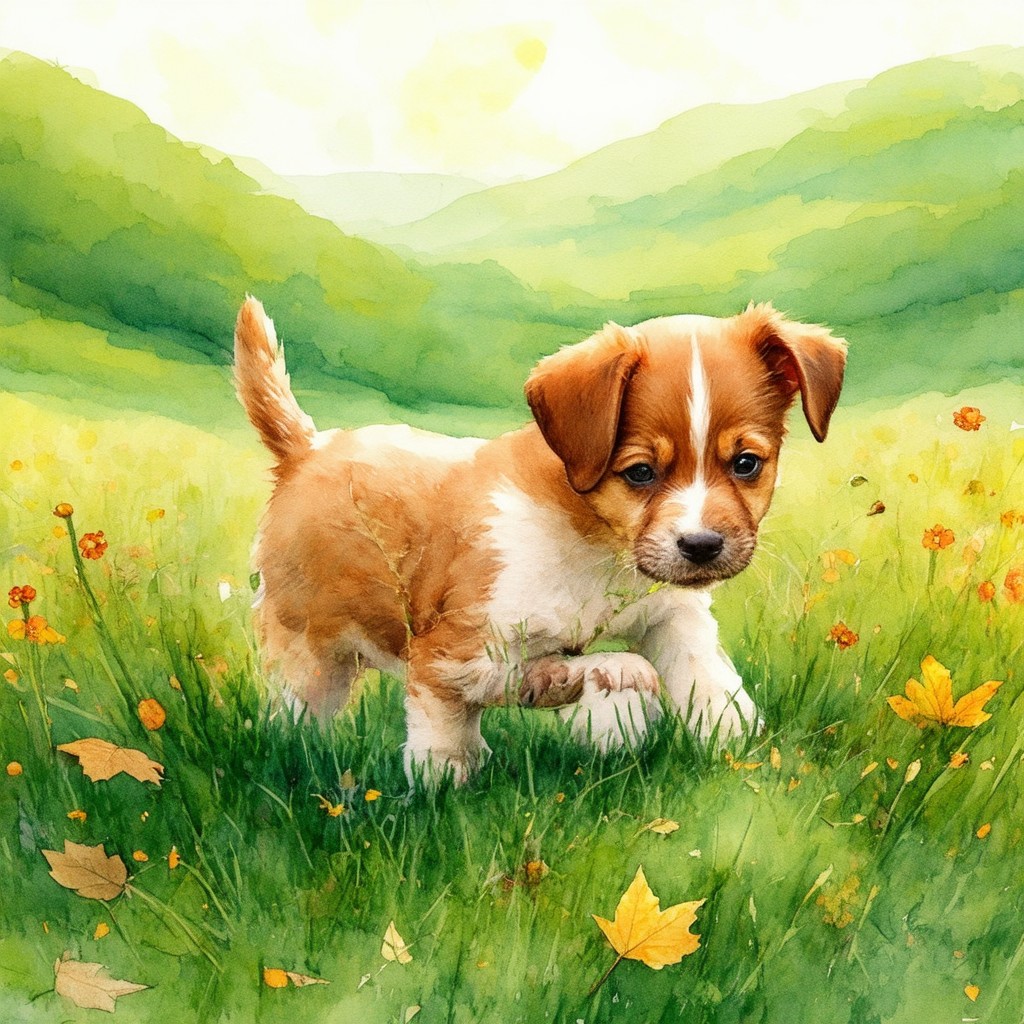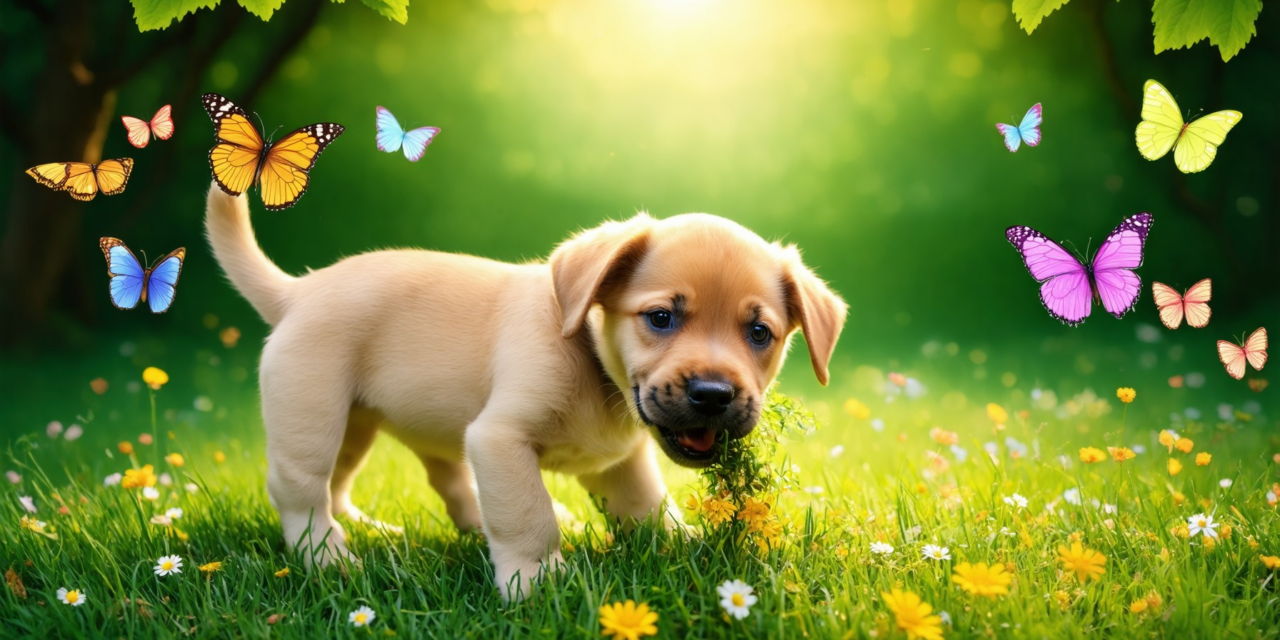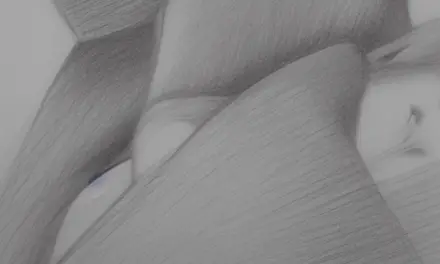Key Takeaways
- Puppy eating grass is often normal behavior and can indicate natural instincts or dietary needs.
- Grass consumption may aid digestion by providing necessary fiber, helping to alleviate gastrointestinal discomfort.
- Excessive grass eating could signal underlying health issues or stress; consult a veterinarian if accompanied by vomiting or diarrhea.
- Monitor your puppy’s diet to ensure it includes essential nutrients, as deficiencies can lead to grass consumption.
- Provide chew toys and regular playtime to redirect boredom-related grass eating and support your puppy’s overall well-being.
As a puppy owner, you may have noticed your furry friend indulging in a curious habit: puppy eating grass. This behavior often raises questions about its normalcy and potential health implications. In this article, we will explore the various reasons behind why dogs eat grass, including whether it is a sign of illness or simply a quirky behavior. We will delve into topics such as the connection between teething and grass consumption, the risks associated with eating leaves and grass, and the nutritional deficiencies that may lead to this behavior. Additionally, we will address common concerns like puppy vomiting white foam after eating grass and how to manage excessive grass eating. By the end of this article, you will have a comprehensive understanding of your puppy’s grass-eating habits and the steps you can take to ensure their health and well-being.
Is it normal for a puppy to eat grass?
Yes, it is normal for a puppy to eat grass, and there are several reasons why they might do so:
- Digestive Needs: Grass can serve as a source of fiber, which aids in digestion and promotes bowel regularity. If a puppy’s diet lacks sufficient roughage, they may instinctively seek out grass to fulfill this need. According to a study published in the Journal of Veterinary Behavior, many dogs consume grass to help alleviate gastrointestinal discomfort.
- Taste and Texture: Some puppies enjoy the taste or texture of grass. Just like humans have food preferences, puppies may find grass appealing, which can lead to occasional munching.
- Boredom or Separation Anxiety: Eating grass can be a coping mechanism for puppies experiencing boredom or anxiety. Engaging in this behavior may provide them with a distraction or a way to self-soothe.
- Pica: Although rare, pica is a condition where dogs eat non-food items, including grass. If a puppy frequently consumes grass and other non-edible materials, it may indicate an underlying issue that requires veterinary attention.
- Exploration: Puppies are naturally curious and explore their environment with their mouths. Eating grass can be part of their exploratory behavior as they learn about their surroundings.
- Attention Seeking: If a puppy realizes that eating grass garners attention from their owner, they may repeat the behavior to receive more interaction.
If your puppy’s grass-eating becomes excessive or is accompanied by other symptoms such as vomiting or diarrhea, it is advisable to consult a veterinarian. Additionally, if you suspect that the grass has been treated with harmful pesticides or herbicides, seek veterinary advice immediately. For personalized guidance on your puppy’s health and diet, discussing concerns with your veterinarian is always a good practice.
Understanding the behavior of dogs eating grass
Dogs eating grass is a common behavior that can be perplexing for many pet owners. Understanding why dogs eat grass can help alleviate concerns and ensure that your puppy remains healthy. Here are some insights into this behavior:
- Natural Instincts: Dogs are omnivores by nature, and their ancestors often consumed plant material as part of their diet. This instinct may carry over to modern dogs, leading them to eat grass.
- Health Benefits: Some studies suggest that grass can help induce vomiting in dogs that are feeling unwell. This behavior may be instinctual, as it can help them expel something harmful from their system.
- Social Learning: Puppies often learn behaviors from observing other dogs. If they see another dog eating grass, they may mimic this behavior out of curiosity or social learning.
Understanding these behaviors can help you manage your puppy’s grass-eating habits effectively. If you notice any concerning signs, such as vomiting white foam or persistent diarrhea, consult your veterinarian for advice.
Common reasons why dogs eat grass
There are several common reasons why dogs, especially puppies, may eat grass:
- Dietary Deficiencies: If a puppy’s diet lacks essential nutrients, they may seek out grass to fulfill their nutritional needs. Ensuring a balanced diet can help mitigate this behavior.
- Curiosity and Playfulness: Puppies are naturally curious and may eat grass simply out of playfulness or exploration. This behavior is often harmless unless it leads to other issues.
- Stress or Anxiety: Just like humans, dogs can experience stress. Eating grass may serve as a coping mechanism for puppies dealing with anxiety or stress.
Monitoring your puppy’s grass-eating habits can provide insights into their overall health and well-being. If you have concerns about their behavior, consider reaching out to a veterinarian for tailored advice and support.

Do Dogs Eat Grass When They Are Sick?
Understanding whether dogs eat grass when they are sick is essential for pet owners. While many dogs may occasionally munch on grass, it can sometimes indicate underlying health issues. Recognizing the signs that your dog may be unwell can help you take appropriate action.
Signs That Indicate Your Dog May Be Unwell
When assessing your dog’s health, look for the following signs that may suggest illness:
- Loss of Appetite: If your dog is refusing food or treats, it may be a sign of digestive issues or other health concerns.
- Lethargy: A noticeable decrease in energy levels or enthusiasm for play can indicate that something is wrong.
- Vomiting: Frequent vomiting, especially if accompanied by dog vomiting white foam, can signal gastrointestinal distress.
- Diarrhea: If your dog is experiencing diarrhea, it may be related to dietary indiscretion or illness.
- Behavior Changes: Any sudden changes in behavior, such as increased anxiety or aggression, should be noted.
If you observe these symptoms alongside your dog eating grass, it may be time to consult a veterinarian for a thorough evaluation.
Why Dogs Eat Grass and Vomit: A Closer Look
Many pet owners wonder, why do dogs eat grass and then throw it up? While some dogs may eat grass to induce vomiting, this behavior is not universal. Here are some insights into why dogs might eat grass and subsequently vomit:
- Digestive Relief: As mentioned earlier, dogs may consume grass to alleviate digestive discomfort. The fibrous texture can help soothe an upset stomach.
- Instinctual Behavior: Eating grass may be an instinctual behavior inherited from their wild ancestors, who sometimes consumed plant matter.
- Inducing Vomiting: Some dogs may instinctively eat grass to induce vomiting when they feel unwell. However, this is not a reliable method for all dogs, and frequent vomiting can lead to further health issues.
If your dog is frequently dog eating grass and throwing up foam, it is crucial to monitor their overall health and consult with a veterinarian to rule out any serious conditions.
Do Puppies Eat Grass When Teething?
Puppies often eat grass during the teething phase, which typically occurs between 3 to 6 months of age. This behavior can be attributed to several factors:
- Teething Relief: Chewing on grass may provide a soothing effect for sore gums as puppies experience discomfort from their emerging teeth. According to the American Kennel Club, chewing helps alleviate pain and distracts them from the discomfort.
- Exploration and Curiosity: Puppies are naturally curious and explore their environment through taste. Grass may simply be an object of interest as they learn about their surroundings.
- Digestive Aid: Some studies suggest that dogs, including puppies, may eat grass to induce vomiting or aid digestion. While this behavior is not fully understood, it is believed that certain grasses can help clear their stomachs of indigestible materials.
- Nutritional Needs: Grass may provide trace nutrients or fiber that puppies instinctively seek out. However, it is essential to ensure that the grass is free from pesticides and chemicals, which can be harmful.
While occasional grass eating is generally not harmful, it is crucial to monitor your puppy’s behavior. Excessive grass consumption can lead to gastrointestinal blockages or other health issues. If you notice your puppy frequently eating grass or showing signs of distress, consult your veterinarian for guidance.
How to Soothe a Teething Puppy
Soothing a teething puppy involves several strategies to alleviate discomfort and redirect their chewing behavior:
- Provide Chew Toys: Offer a variety of safe, durable chew toys designed for teething puppies. These can help relieve gum pain and satisfy their urge to chew.
- Cold Treats: Chilling chew toys or offering frozen treats can provide additional relief. The cold sensation can numb sore gums and reduce inflammation.
- Regular Playtime: Engage your puppy in regular play sessions to distract them from the discomfort of teething. Physical activity can help reduce their urge to chew on inappropriate items.
- Positive Reinforcement: If your puppy chooses a toy over grass or other non-desirable items, reward them with praise or treats. This encourages good behavior and helps them learn what is acceptable to chew on.
By implementing these strategies, you can help your puppy navigate the teething phase more comfortably while minimizing unwanted grass eating. For more tips on puppy care, check out our blog on wellness topics.
Is it bad for puppies to eat leaves and grass?
Puppies eating leaves and grass is a common behavior that many pet owners observe. While it is not inherently harmful for puppies to consume small amounts of grass or leaves, there are several important considerations to keep in mind:
Potential risks of dogs eating grass and leaves
Ingesting large quantities of grass or leaves can lead to gastrointestinal blockages, particularly in puppies with smaller digestive tracts. Symptoms of a blockage may include vomiting, lethargy, and loss of appetite. If you notice these signs, it is crucial to consult a veterinarian immediately. Additionally, some plants can be toxic to dogs, so it’s essential to identify what types of grass and leaves your puppy is consuming. Always ensure that your puppy is not eating anything harmful, as certain plants can cause serious health issues.
Safe plants for puppies: what to know
To keep your puppy safe, it’s important to know which plants are safe for them to consume. Some safe options include:
- Wheatgrass: Often used in pet health products, it can aid digestion.
- Cat grass: A safe choice that many dogs enjoy.
- Parsley: In small amounts, it can be beneficial for freshening breath.
Always monitor your puppy’s behavior and the frequency of grass or leaf consumption. If your puppy is frequently eating grass and subsequently vomiting, it may indicate an underlying health issue that requires veterinary attention. To discourage your puppy from eating grass and leaves, provide them with safe chew toys or engage them in regular playtime. This can help reduce boredom and redirect their chewing behavior to more appropriate items.
If you have ongoing concerns about your puppy’s dietary habits, consider consulting a veterinarian or a pet nutritionist. They can provide tailored advice and ensure your puppy’s diet is balanced and healthy. For more information on dog health, visit Understanding Dog Health.

Do Dogs Eat Grass When They Have Worms?
Understanding the link between worms and grass consumption is essential for pet owners. Many dog owners have observed their pets eating grass, leading to questions about whether this behavior indicates a health issue, such as a worm infestation. Dogs may eat grass for several reasons, including potential health issues or behavioral factors. Here are the key points to consider:
- Worm Infestation: Some dogs may consume grass in an attempt to expel worms or other parasites from their digestive system. This behavior is often instinctual, as wild canines have been observed doing the same.
- Digestive Aid: Grass can act as a source of roughage, which may help with digestion and alleviate constipation or stomach upset. According to a study published in the Journal of Veterinary Behavior, many dogs eat grass to induce vomiting, which can help eliminate irritants or parasites.
- Behavioral Reasons: Dogs may eat grass out of boredom, anxiety, or as a habitual behavior. Providing mental stimulation and regular exercise can help reduce this behavior. Engaging your dog in interactive play or training can be beneficial.
- Nutritional Deficiencies: If dogs are lacking certain nutrients in their diet, they might turn to grass as a supplement. Ensuring a balanced diet rich in essential vitamins and minerals can mitigate this behavior.
- Medical Conditions: Underlying health issues, such as gastrointestinal disorders, can lead to increased grass-eating behavior. If your dog frequently consumes grass, it’s crucial to monitor for additional symptoms like vomiting, diarrhea, or lethargy.
- Veterinary Consultation: If you suspect your dog has worms or other medical issues, consulting a veterinarian is essential for proper diagnosis and treatment. Regular veterinary check-ups can help prevent infestations and ensure your dog’s overall health.
- Avoid Treated Lawns: Keep your dog away from lawns treated with chemicals, as these can be harmful if ingested. Opt for organic or untreated areas for your dog to explore.
- High-Fiber Diet: If grass-eating is linked to digestive issues, consider a high-fiber diet to promote better digestive health. Foods rich in fiber can help regulate your dog’s digestive system.
- Addressing Behavioral Issues: If your dog’s grass consumption stems from boredom or anxiety, increasing their physical activity and providing enrichment activities can help alleviate these behaviors.
For further reading, consult sources such as the American Kennel Club and PetMD, which provide insights into canine behavior and health.
Symptoms of Worms in Dogs: What to Watch For
Recognizing the symptoms of worms in dogs is crucial for timely intervention. Here are some common signs that may indicate your dog is suffering from a worm infestation:
- Vomiting: If your dog is vomiting, especially if the vomit contains worms or appears as dog puking white foam, it may be a sign of a serious issue.
- Diarrhea: Frequent diarrhea, particularly if it is accompanied by blood or mucus, can indicate worms.
- Weight Loss: Unexplained weight loss despite a normal appetite can be a symptom of worms.
- Abdominal Swelling: A bloated abdomen can be a sign of severe worm infestations.
- Changes in Appetite: Increased or decreased appetite may indicate health issues, including worms.
- Behavioral Changes: Lethargy or unusual behavior can signal that your dog is unwell.
If you notice any of these symptoms, it is essential to consult your veterinarian for a proper diagnosis and treatment plan. Regular check-ups can help keep your dog healthy and prevent issues like puppy eating grass and vomiting due to underlying health problems.
What are dogs lacking when they eat grass?
Understanding why dogs, particularly puppies, engage in the behavior of eating grass can provide valuable insights into their nutritional needs and overall health. Dogs may eat grass for several reasons, often indicating nutritional deficiencies or behavioral issues. Here are the key factors to consider:
Nutritional deficiencies that may lead to grass eating
Dogs may consume grass if their diet lacks essential nutrients such as fiber, vitamins, or minerals. A balanced diet is crucial for their overall health. According to the American Kennel Club, insufficient dietary fiber can lead dogs to seek out grass to aid digestion. Here are some specific nutritional aspects to consider:
- Fiber Intake: Grass is a natural source of fiber, which can help regulate a dog’s digestive system. Increased fiber intake can facilitate better nutrient absorption and promote regular bowel movements. If your dog is not getting enough fiber from their regular food, consider incorporating high-fiber dog-safe foods, such as pumpkin or sweet potatoes, into their diet.
- Vitamins and Minerals: A deficiency in certain vitamins and minerals can lead dogs to seek alternative sources of nutrition, such as grass. Ensuring your puppy’s diet is rich in essential nutrients is vital for their growth and health.
- Instinctual Behavior: Eating grass may be an instinctual behavior inherited from their wild ancestors, who consumed plant matter along with their prey. This behavior is often seen in dogs that are not experiencing any health issues.
How to ensure your puppy’s diet is balanced
To maintain a healthy diet for your puppy and prevent them from eating grass out of nutritional necessity, consider the following tips:
- Consult a Veterinarian: Regular veterinary check-ups can help identify any nutritional deficiencies or health concerns that need to be addressed. Your vet can recommend a balanced diet tailored to your puppy’s specific needs.
- Quality Dog Food: Choose high-quality dog food that meets the nutritional standards set by the Association of American Feed Control Officials (AAFCO). Look for foods that list meat as the first ingredient and contain a balance of proteins, fats, and carbohydrates.
- Supplementation: If your puppy’s diet is lacking in certain nutrients, consider adding supplements as recommended by your veterinarian. This can help fill any gaps and support overall health.
- Monitor Behavior: Keep an eye on your puppy’s eating habits and behavior. If you notice excessive grass eating or other unusual behaviors, consult your veterinarian to rule out any underlying health issues.
In summary, while occasional grass eating is generally not harmful, it can indicate that your dog may be lacking essential nutrients or experiencing behavioral issues. Regular veterinary check-ups and a balanced diet are key to ensuring your dog’s health and well-being. For further reading, consult resources such as the ASPCA and veterinary blogs that discuss canine nutrition and behavior.
Puppy eating grass and vomiting
Why does my dog eat grass and then vomits?
Puppies often eat grass for various reasons, and one common outcome is vomiting. This behavior can stem from a natural instinct, as many dogs may consume grass to induce vomiting when they feel unwell. The act of eating grass can stimulate the stomach lining, leading to the expulsion of its contents. This is particularly true if the puppy has an upset stomach or has ingested something that doesn’t agree with them. However, it’s essential to monitor the frequency of this behavior. If your puppy is frequently eating grass and vomiting, it may indicate an underlying health issue that requires veterinary attention.
Additionally, some puppies may eat grass simply out of boredom or curiosity. They might enjoy the texture or taste, leading to occasional vomiting as a side effect. If you notice your puppy eating grass and then vomiting, it’s crucial to observe their overall health and behavior. If they seem lethargic, have a decreased appetite, or show signs of distress, consult your veterinarian for a thorough evaluation.
How long after eating grass will a dog vomit?
The time it takes for a dog to vomit after eating grass can vary significantly. Generally, if a puppy is going to vomit after consuming grass, it may occur within a few minutes to a couple of hours. Factors such as the puppy’s individual digestive system, the amount of grass consumed, and their overall health can influence this timing.
If your puppy eats grass and then vomits, you might notice them retching or showing signs of discomfort shortly after. In some cases, the vomit may contain grass, which can be alarming but is often not harmful. However, if your puppy is consistently vomiting white foam or exhibiting other concerning symptoms, such as diarrhea or lethargy, it’s advisable to seek veterinary advice. Regular vomiting can lead to dehydration and other health issues, so keeping an eye on your puppy’s behavior is essential.
For more information on dog health and wellness, you can visit the [American Kennel Club](https://www.akc.org/) or [PetMD](https://www.petmd.com/) for expert advice.













